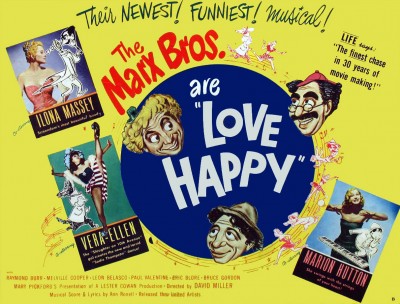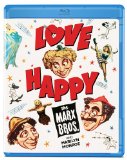| Reviews & Columns |
|
Reviews DVD TV on DVD Blu-ray 4K UHD International DVDs In Theaters Reviews by Studio Video Games Features Collector Series DVDs Easter Egg Database Interviews DVD Talk Radio Feature Articles Columns Anime Talk DVD Savant Horror DVDs The M.O.D. Squad Art House HD Talk Silent DVD
|
DVD Talk Forum |
|
|
| Resources |
|
DVD Price Search Customer Service #'s RCE Info Links |
|
Columns
|
|
|
Love Happy
For the Marx Bros., Groucho, Chico, and Harpo, the answer is not so cut-and-dried. They officially "retired" as a team after The Big Store (1941), their last film for MGM, but reteamed for A Night in Casablanca (1946), an unexpected hit. Most Marx aficionados regard Love Happy (1949) as their last starring movie, though Groucho is mostly off on the sidelines and barely interacts with Harpo and Chico. All three appeared in The Story of Mankind (1957) but in separate vignettes and, besides, those were glorified cameo appearances anyway.
Love Happy doesn't get a lot of love from Marx Bros. fans. It's a notably disjointed, aimless movie, sort of a reworking of their classic A Night at the Opera (1935) minus that film's plot and fine writing, but it's pretty good in other ways, and in some respects better than either Go West (1940) and The Big Store (1941). Unlike, say, Laurel & Hardy as well as Buster Keaton, who later in their starring careers were helpless against Big Studio interference that subtly but ruinously altered their famous characterizations, at least in Love Happy the Marx Bros. get to stay in character, and several bits in the film are actually quite funny. The film's musical subplot is insipid and clichéd, but the musical numbers themselves are pretty decent.
Originally released by United Artists (and executive-produced by one of its founders, silent star Mary Pickford), Love Happy now resides at Paramount, and, sublicensed here to Olive Films, this odd but fascinating little film is presented in an eye-pleasing transfer.
Love Happy has only the vaguest semblance of a plot. About half the film's 91-minute running time concerns femme fatale Madame Egelichi (Ilona Massey), who with henchmen Lefty Throckmorton (Melville Cooper), and brothers Alphonse (Raymond Burr), and Hannibal Zoto (Bruce Gordon), are trying to recover the stolen Romanoff Diamonds, hidden in a can of sardines that Harpo innocently steals (along with a busload of other food) from Throckmorton's gourmet food shop, a front for the thieves.
The other half of the film is a backstage musical, where Harpo works as a kind of mascot. The show's director, Mike Johnson (Paul Valentine), hires Faustino (Chico), promoting his terrible mind-reading act, after Chico smooth-talks one of the show's nervous backers, Mr. Lyons (actor-violinist Leon Belasco), from pulling out. Mike, for the record, is in love with Maggie Phillips (Vera-Ellen), the show's dancing star.
To say Love Happy is disjointed would be an understatement. Originally conceived under the title "Diamonds in the Sidewalk," it was intended as a solo film for Harpo but for reasons unclear to this day Chico and Groucho eventually became part of the film. It's generally accepted that Chico was brought in for no other reason than he needed the money. A chronic gambler, he was constantly in debt, and usually bailed out of trouble by his other brothers, apparently mainly Groucho and younger brother, Gummo, then working as a Hollywood agent. The fifth and youngest Marx brother, Zeppo, also gambled heavily.
The reasons for Groucho's participation are less certain. A 1992 book about the team claims Groucho was pegged to appear in the film from the beginning, long before shooting began. Maybe, but the finished film gives every indication that Groucho was a last-minute addition. He appears in pre-titles segment as Private Eye Sam Grunion ("grunion" are a beach-spawning silver fish), and from his Chandleresque office narrates the film. The movie climaxes with a big rooftop chase, and near the end of that Groucho suddenly turns up, very briefly interacting with Harpo and Ilona Massey but no one else. (Groucho and Massey are also seen together earlier in the film, in a series of photographs Grunion keeps.) The very end of the picture finds Groucho/Grunion back in his office, where Chico/Faustino is playing cards, but Groucho and Chico are never in the same shot, suggesting their footage was shot days, even weeks or months apart.
Groucho's role as Grunion, "Narrator of the Story" (so say the credits) serves no purpose. Because he exerts no influence on the plot and his narration is so superfluous, there's every reason to think he was a last-minute addition to the first shooting script, even if Groucho had been desired for a co-starring role before that. It's reasonable to surmise that, added late in the production, someone made the decision to incorporate him into the rooftop chase if only because those sets were still standing. Grunion certainly has no particular reason to be there. Minus the narration and Groucho's footage Love Happy would run about 80 minutes, probably its originally intended length.
Also supporting this argument is the fact that the rooftop climax almost certainly was filmed last, reportedly because the production ran out of money before it was done, forcing the producers to make what for the time was a fairly radical decision to prevent the film being shelved entirely. The filmmakers employed what today would be called product-placement: on the rooftop are huge neon signs advertising Kool cigarettes, Bulova watches, Wheaties cereal, and General Electric light bulbs, among others. Such product-placement is commonplace today, if a bit subtler than it was on many late-1970s and early ‘80s films, but back then it was practically unheard of, and probably never before as blatant as this.
The picture plays like a far-from-ready rough cut. Some scenes begin with actors' mouths flapping before their voices are heard. There are numerous fade-outs and straight cuts that don't have any clear purpose. Scenes present themselves, simply end, and it's on to the next one, with no sense of bridging them smoothly.
Groucho's scenes suffer the most. While his dialogue, much of it probably written by Frank Tashlin, is pretty funny, the movie denies him the opportunity to make hay of high society types (no Margaret Dumont here) and pompous pseudo-intellectuals. Instead, he gets to leer at Marilyn Monroe in what was only her third speaking part in a movie. The way she's dressed and looked at this point in her early career, Monroe looks like the most direct inspiration for Jessica Rabbit (from Who Framed Roger Rabbit).
The movie gives her an "and introducing credit" (along with Bruce Gordon who, alas, never became a sex symbol) and she wasn't listed on the original posters, though later releases dishonestly played up her appearance in the film, all one minute's worth.
The picture itself ain't bad. Both Chico and especially Harpo get to do some funny stuff. Undoubtedly the highlight is a strange, surreally funny scene where Madame Egelichi, hoping to find the diamonds she thinks Harpo's has, hypnotizes him with "The Whammy," and his bizarre, frozen look is priceless. Then, Alphonse and Hannibal search Harpo's endlessly stuffed jacket. Among other things, from it they extract a welcome mat, a spinning barber pole, a lady mannequin's legs, and a block of ice.
Vera-Ellen was typically associated with big studio films around this time, mostly musicals for MGM (On the Town, Three Little Words), so it's a little strange to see her in such a comparatively minor feature. Nevertheless, Love Happy isn't a bad showcase for her dancing, and her scenes with Harpo, he consoling her on her birthday, are nicely played by both performers. Harpo, incidentally, gets his usual harp solo, while Chico, on piano, teams with violinist Belasco for a funny adaptation of Victor Herbert's "Gypsy Love Song.
Video & Audio
The black-and-white, 1.37:1 video transfer of Love Happy is pretty good, a noticeable improvement over previous home video versions. The mono audio, with no accompanying English or other subtitles, is also fine. No Extra Features.
Parting Thoughts
A bit better than its reputation, and certainly worth a look if only for its bizarre qualities, Love Happy is heartily Recommened.
Stuart Galbraith IV is the Kyoto-based film historian and publisher-editor of World Cinema Paradise. His credits include film history books, DVD and Blu-ray audio commentaries and special features.
|
| Popular Reviews |
| Sponsored Links |
|
|
| Sponsored Links |
|
|
| Release List | Reviews | Shop | Newsletter | Forum | DVD Giveaways | Blu-Ray | Advertise |
|
Copyright 2024 DVDTalk.com All Rights Reserved. Legal Info, Privacy Policy, Terms of Use,
Manage Preferences,
Your Privacy Choices | |||||||















